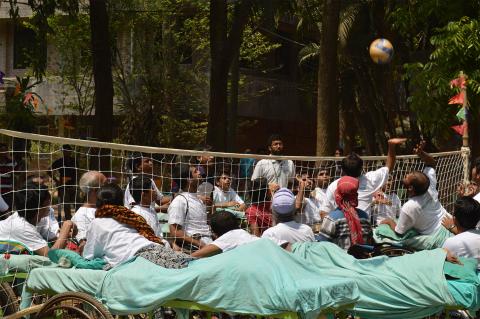You are in this section
Rehabilitating Rana Plaza Survivors: treating stress with sport
Unobserved traumas and mental health issues are injuries that victims of the Rana Plaza disaster continue to battle and in doing so, evidence the lack of responses to mental and physical support for disaster victims in developing countries, a study undertaken by International Inspiration's (IN) partner the Centre for the Rehabilitation of the Paralysed (CRP) and the University of Texas Health Science Centre, has found.
The scars of those left injured or disabled by the Rana Plaza disaster are only a part of the harrowing survival stories. For victims like Rehana, who lost both legs and was diagnosed with Post Traumatic Stress Disorder (PTSD), the road to recovery has been focused around an unlikely treatment – sport.
At 4pm every day, just metres away from the abandoned site where Rana Plaza once stood, a volleyball match is about to start at one of Bangladesh’s lesser-known buildings, CRP. Sport and traditional games have become an essential part of life for survivors as a means to manage emotional stress and physically build strength. These activities form CRP’s uniquely holistic treatment and is one of few examples found elsewhere in Bangladesh. CRP is raising awareness of mental health issues and feeding this evidence to the International Labour Organisation (ILO), to oversee repayments back to victims from the contested Rana Plaza Donors Trust Fund.
The study found that 76% of victims of the Rana Plaza disaster treated at CRP, like Rehana, had PTSD. The centre is responsible for providing healthcare but also provides prostheses and assistive aids for patient’s homes to provide better access to public services and ensure a smooth transition back into their everyday lives when discharged.
“Sport has played a considerable role in rehabilitating survivors as CRP medical assessments found that victims participating in games and play increased emotional and cognitive responses and reduced abnormal behaviour,” says Krishno Sen, an Occupational Therapist at CRP.
“Sport and recreational activities support the rehabilitation process of patients with disabilities by making them physically and mentally stronger. When patients are well enough to return to their communities, they feel more confident in their own ability to adapt and respond to their living environment and play an active role within their communities,” he continues.
Now discharged from CRP, sport has provided Rehana with the confidence to return to her community and with the prosthesis provided, enjoy greater mobility to travel around Dhaka. Through sport her confidence to use the prosthesis has soared and she is able to positively interact with others. Her future that may have once seemed bleak two years ago, is now full of hope.
Sport addresses the wider goal of integrating and mobilising the 1 in 7 people worldwide living with some form of disability, often left behind and unable to access physical and emotional outlets such as sport. It gives people a voice and platform in which to show that they can and are able to face the same challenges as others.
CRP’s investment in sport is evident not only by the time set aside for sport every day, but through the training of all staff members who know how to adapt sport for every type and level of disability. This support comes through IN's Access and Empowerment programme.

